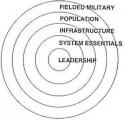Actually, I'm kidding...
After reading your comments, I wanted to offer a counter perspective because of what I would term your unwillingness to consider the alternative (majority) view point on FM 3-24.
However, after reading (scanning) the Global Counterinsurgency:...
I have to concede your point that Keenan would be rolling his eyes in his grave. The most significant issue with the proposed approach is that it turns the "80/20 rule" on its head. You might be able to make the arguement that this would be an approach for a military strategy in an area in which a "whole-of-govt" approach is applied, but the authors seem to pose the construct as a national policy approach. Not sure when security became narrowly construed as military, but that appears the case in this instance.
Live well and row brother









Bookmarks